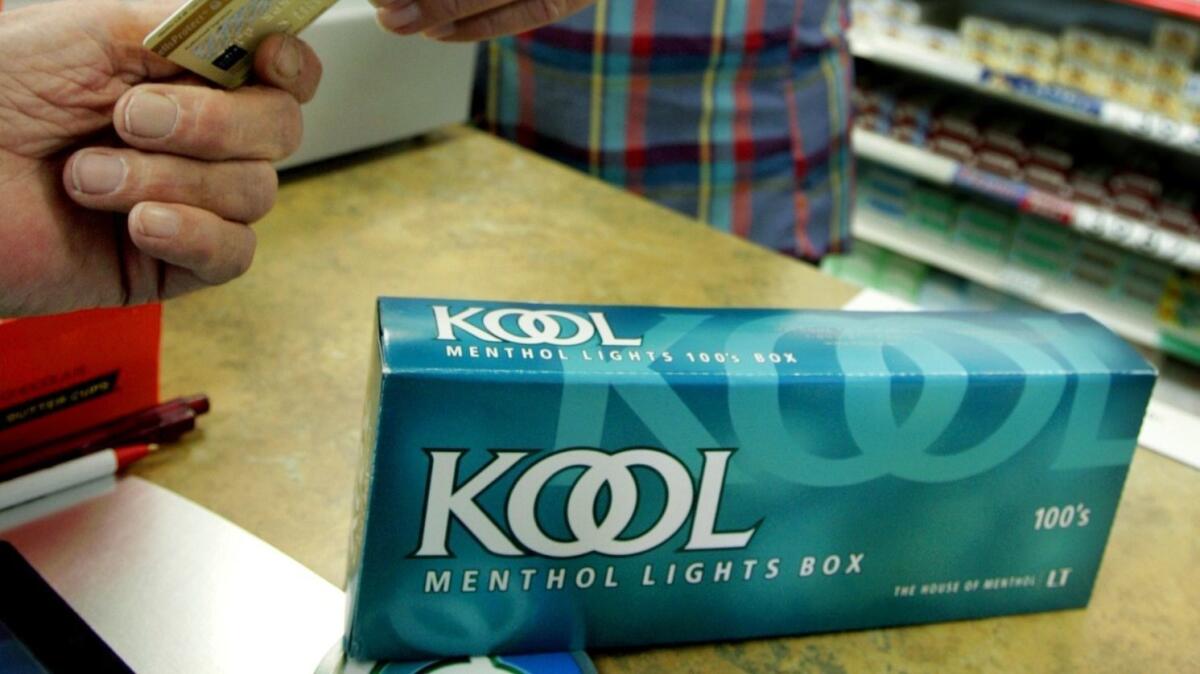FDA seeks to ban menthol cigarettes and crack down on flavored vapes

In a major new effort to curb smoking, a top U.S. health official pledged Thursday to try to ban menthol from regular cigarettes, outlaw flavors in all cigars and tighten rules regarding the sale of most flavored versions of electronic cigarettes.
The restrictions, announced by Food and Drug Administration chief Scott Gottlieb, are aimed mainly at reducing smoking by kids: About half of teens who smoke cigarettes choose menthols, and flavored e-cigarettes have been blamed for a recent increase in teen vaping rates.
“I will not allow a generation of children to become addicted to nicotine through e-cigarettes,” Gottlieb said in a statement.
Health advocates say a menthol ban would have greater effect on the health of Americans but probably would take years to put in place. The changes for e-cigarettes could kick in within a few months.
Battery-powered e-cigarettes are more popular among teens than regular cigarettes and are considered safer. But many versions contain potentially addictive nicotine, and health officials believe that they set kids who try them on a path toward regular cigarettes.
Gottlieb called for additional steps to prevent the marketing of e-cigarettes directly to kids and prevent online sales to minors. He also proposed beefing up measures so that convenience stores and some other retailers don’t sell e-cigarettes in kid-friendly flavors such as cherry and vanilla. Those flavors could still be sold in vape shops and other stores that don’t admit minors.
Smoking is the nation’s leading cause of preventable illness, causing more than 480,000 deaths each year. The FDA bans sales of e-cigarettes and tobacco products to those under 18.
In 2009, the government banned a number of kid-friendly flavorings in cigarettes. But after an aggressive lobbying effort by tobacco companies, menthol was exempted.
Gottlieb’s proposal for e-cigarette flavorings also exempts menthol. He said menthol e-cigarettes may be an option for adults who turn to vaping products to quit regular cigarettes.
The nation’s smoking rate has been declining for more than five decades. About 42% of U.S. adults smoked in the early 1960s. Last year, it was down to 14%, according to the Centers for Disease Control and Prevention.
Experts credit anti-smoking campaigns, cigarette taxes and smoking bans for most of the decline in the adult rate. But some say adult smokers switching to e-cigarettes have helped drive down the rate in recent years.
The cigarette smoking rate is even lower among high school students — about 9%, according to the latest figures.
But e-cigarette use jumped 78% this year in high school kids and 48% among middle school kids, Gottlieb said, citing new survey data.
Some experts attribute the jump to newer versions of e-cigarettes, such as those by Juul Labs Inc. They resemble computer flash drives, can be recharged in USB ports and can be used discreetly.
“The increase in e-cigarette popularity [among kids] is almost certainly not a function of flavors. All the flavors were out there already,” said Kenneth Warner, a University of Michigan emeritus public health professor who is a leading authority on smoking and health.
The FDA has taken earlier steps to investigate the marketing of e-cigarettes by San Francisco-based Juul — the market leader — and a number of other companies.
Getting out ahead of Thursday’s FDA announcement, Juul announced Tuesday that it stopped filling stores’ orders for mango-, fruit-, creme- and cucumber-flavored nicotine pods and would resume sales only to retailers that scan IDs and take other steps to make sure a buyer is at least 21. Juul said it would continue to sell menthol and mint-flavored nicotine pods through retail stores and would sell all flavors through its website.
Health advocates generally applauded the e-cigarette plans the FDA announced Thursday, but some said they did not go far enough. Some called for a complete ban of flavorings, for example, and a more aggressive regulation of e-cigarettes that have come on the market in the last two years.
The proposed sales restrictions “are a step forward, but by themselves are not enough to stem the youth e-cigarette epidemic,” said Robin Koval, chief executive of the Truth Initiative, an advocacy group that runs anti-tobacco ads.
Gottlieb acknowledged that he could have taken more aggressive steps, “but I don’t want to foreclose opportunities for currently addicted adult smokers” to access e-cigarettes as they try to quit regular smokes.
He also said he hopes e-cigarette companies work to restrict kids from buying their products. If the efforts he outlined do not succeed, he’s willing to take more steps later, he said.
Some said the measures aimed at flavorings in cigars and cigarettes — if they come to pass — would be much more consequential.
Menthol cigarettes, which contain a minty compound that reduces the harshness of smoke and suppresses coughing, were widely marketed starting in the 1950s and 1960s.
Roughly a third of the cigarettes sold today are menthols, according to some estimates.
The e-cigarettes measures will probably face little opposition, Warner said, but Gottlieb “has guts” to pursue a menthol prohibition because it will draw political and legal fire from the tobacco industry and its supporters.
An official with Altria Group Inc., one of the big tobacco companies, said a total ban on menthol cigarettes or flavored cigars “would be an extreme measure not supported by the science and evidence.”
Murray Garnick, Altria’s general counsel, said the company expects that establishing product standards on menthol cigarettes and flavored cigars “will be a multi-year, deliberative process.”
UPDATES:
11 a.m.: This article was updated with expert and industry comments.
8:50 a.m.: This article was updated throughout with additional details.
This article was originally published at 7:25 a.m.






